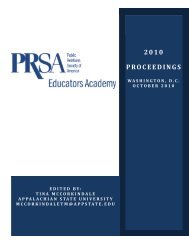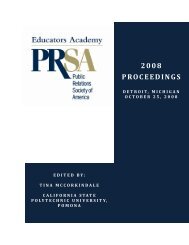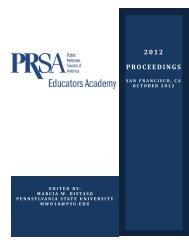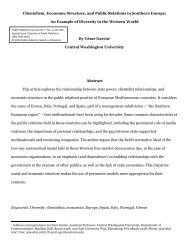2009 PROCEEDINGS - Public Relations Society of America
2009 PROCEEDINGS - Public Relations Society of America
2009 PROCEEDINGS - Public Relations Society of America
Create successful ePaper yourself
Turn your PDF publications into a flip-book with our unique Google optimized e-Paper software.
programs for small children to improve early stimulation, training programs with<br />
teenagers to introduce them to new farming techniques such as organic potato and sweet<br />
potatoes, training programs with young adults on livestock farms that improved guinea<br />
pig husbandry (guinea pigs constitutes a traditional food in Peruvian highlands), training<br />
programs with local artisans to help them learn new weaving skills and sell their products<br />
nationally and abroad, and training programs with mid-age women to teach them how to<br />
cook by using low consumption <strong>of</strong> firewood.<br />
Six participants agreed that companies needed to assure that the benefits that<br />
resulted from extractive activities will result in the sustainable development <strong>of</strong> the host<br />
community. Five participants stated that corporate socially responsibility, as well as<br />
environment responsibility has become fashionable terms in Peru. In addition, four<br />
participants expressed that the increased interest that companies showed in adopting<br />
socially responsible practices in Peru was because <strong>of</strong> the pressure that some international<br />
institutions such as the International Finance Corporation (IFC) or the World Bank exert<br />
to companies. According to these participants, social responsibility practices were a<br />
determining factor in evaluating loans for mining, gas and industrial projects.<br />
Six participants expressed that they relied on radio to disseminate information in<br />
order to raise awareness on issues <strong>of</strong> concern <strong>of</strong> the community, as well as to promote<br />
participation on community-based workshops and other engagement activities. It is<br />
important to note that one <strong>of</strong> the participant stated that the radio places the company in<br />
closer proximity to the community because it was the only means that broadcast in the<br />
community’s native language (Quechua). One <strong>of</strong> the participants stated that the company<br />
has launched a radio program in which the organization disseminates information on<br />
company’s activities as well as other issues <strong>of</strong> concern, such as water management and<br />
nutrition. Another participant stated that the company has launched a radio program that<br />
<strong>of</strong>fers tips on how to promote small businesses and artisan’s knowledge on business<br />
topics. Other ways that practitioners used to reach out to communities were by utilizing<br />
word <strong>of</strong> mouth, such as disseminating information at local civil community associations<br />
such as “comedores populares” (“public living rooms”), which represent open eatingplaces<br />
funded by the government to assist community in their food needs. Also,<br />
practitioners stated that they used word <strong>of</strong> mouth at community market fairs which<br />
represent an open place where community members gathered with member <strong>of</strong> other<br />
communities to exchange, trade and sell their products and goods. These community<br />
market fairs are held on the weekends.<br />
It is important to note that participants expressed that several external factors have<br />
shaped the way they practice public relations in Peru, including political, social and<br />
economical factors such as, poverty, social violence, terrorism, implementation <strong>of</strong> open<br />
market initiatives, arrival <strong>of</strong> multinational companies in the early 90’s, activism<br />
expressed by international and domestics organizations, corruption, media activism,<br />
disparity between urban and rural culture among others.<br />
One <strong>of</strong> the interviewees clearly illustrated this point by expressing that “Peru has<br />
learned lessons from previous faults” and that today, in order to achieve sustainable and<br />
long terms goals for the company, it was essential to reach understanding and a<br />
consensus with key publics, especially local stakeholders (community and local<br />
authorities).<br />
30

















